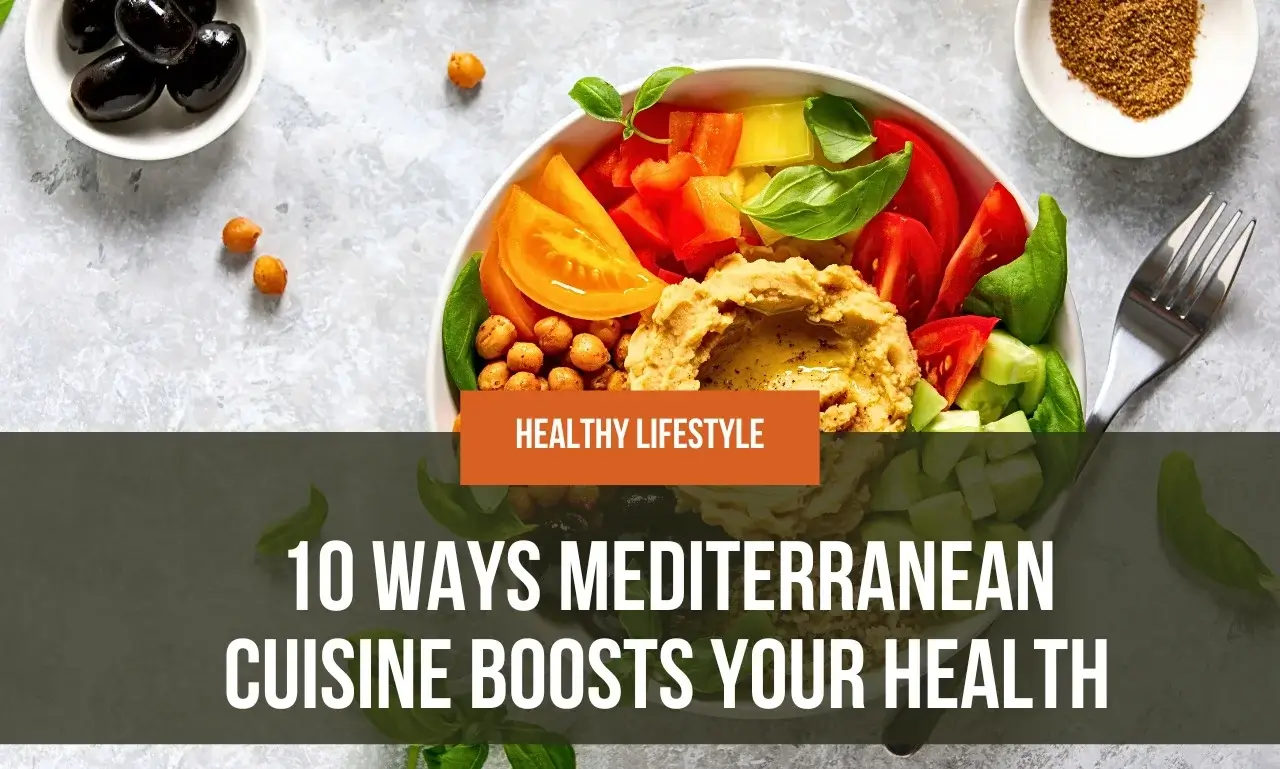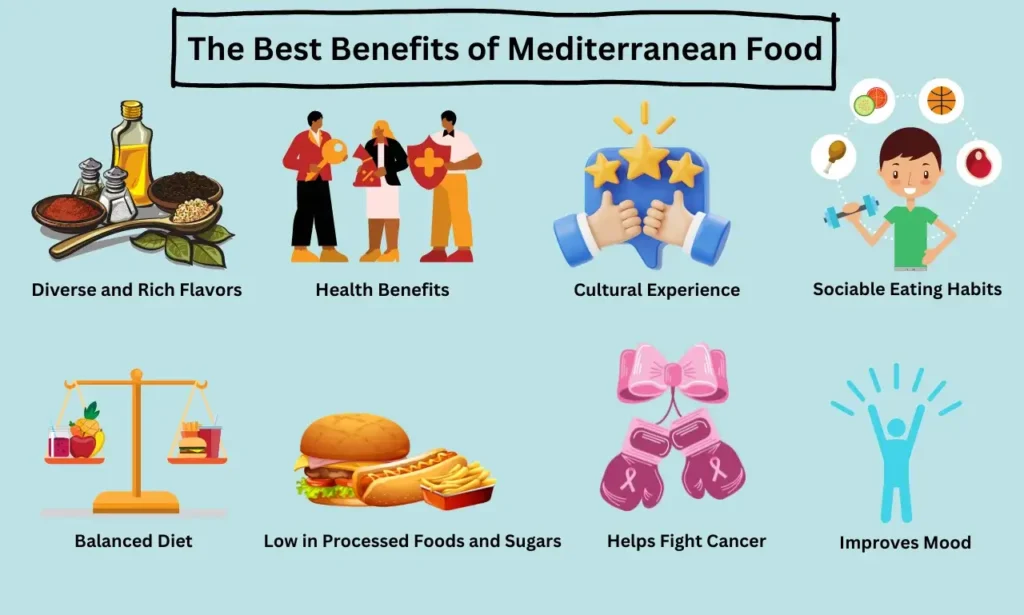Share on social media

Mediterranean Cuisine health benefits take center stage in Houston’s vibrant culinary landscape, where diverse cultures converge on every plate. Among the city’s standout offerings, Mediterranean food shines for both its irresistible flavors and its nourishing ingredients. Local favorites—from tangy tzatziki to hearty shawarma—feature olive oil, fresh vegetables, and lean proteins, delighting diners who value taste as much as wellness.
Beyond bold flavors, Mediterranean dishes deliver a balanced nutritional profile. Whether you’re savoring a rich, slow-cooked stew or enjoying simply seasoned, freshly grilled seafood, each bite embodies the time-honored principles of the Mediterranean diet. As more Houstonians seek wholesome yet satisfying meals, Mediterranean cuisine has become a staple in the city’s ever-evolving food culture, proving that great taste and good health can share the same table.
Mediterranean food comes from countries around the Mediterranean Sea, such as Greece, Italy, Spain, Lebanon, and Turkey. It uses olive oil, fresh fruits and vegetables, legumes, fish, poultry, herbs, and spices. The result is a mix of delightful flavors and textures that are both fresh and natural. This balanced approach to food makes Mediterranean cuisine popular with health-conscious eaters.

Mediterranean food is celebrated for its incredible diversity and rich flavors. Whether you prefer the comforting warmth of slow-cooked stews like lamb tagine or the simplicity of freshly seasoned seafood such as grilled octopus, there’s a wide range of flavors to explore and enjoy.
Each meal offers a new adventure, from the savory layers of Moussaka to the refreshing bite of a crisp Greek salad. This cuisine’s unique blend of herbs, spices, and fresh ingredients ensures that every dish bursts with flavor and excitement. Dive into the Mediterranean culinary experience and discover a world where each bite tells a story of tradition and taste.
Mediterranean cuisine is famous for its fantastic health benefits, making it an excellent diet choice for everyone in Houston. Eating Mediterranean food can help keep your heart healthy, manage your weight, and improve your overall well-being. This diet includes high-fiber foods like whole grains, lean proteins like fish and chicken, and healthy fats from nuts and olive oil. Focusing on fresh, natural ingredients ensures you get the nutrients your body needs.
Research has consistently shown that adhering to a Mediterranean diet can significantly reduce the risk of serious health conditions such as heart disease, diabetes, and certain types of cancer. The abundance of fruits and vegetables in this diet, rich in antioxidants, can help you maintain good health and potentially extend your lifespan. These antioxidants combat harmful substances in your body, keeping you robust and energetic.
By enjoying Mediterranean food, you can simultaneously eat delicious meals and care for your health. It’s a tasty and innovative way to stay fit and feel great! To learn more about the benefits of the Mediterranean diet, check out our detailed guide.
Authentic Mediterranean food is made with fresh, local, and natural ingredients, making it a healthy and delicious choice. Think ripe tomatoes, crisp cucumbers, and locally sourced olive oil, staples in many Mediterranean dishes. Using ingredients at their peak, these dishes are bursting with flavor and packed with essential nutrients. Enjoying Mediterranean cuisine means getting the best nature has to offer, helping you feel your best every day. Fresh vegetables, whole grains, lean proteins, and healthy fats create meals that support overall health benefits and well-being. Focusing on quality ingredients means that every bite is satisfying and nourishing. Whether it’s a vibrant Greek salad or a hearty tabbouleh, the freshness of the ingredients shines through, making each dish a wholesome choice.
Eating Mediterranean food is not just about taste; it’s also a cultural journey. Each dish tells a story, reflecting thousands of years of history, tradition, and culture. This culinary tradition helps you understand and appreciate the rich cultural tapestry of the Mediterranean region. Whether you’re savoring a dish influenced by Greek, Turkish, Italian, or Middle Eastern cuisine, you’re experiencing a part of the region’s history and heritage. The methods of preparation and the ingredients used are often passed down through generations, preserving a connection to the past while enjoying a delicious meal in the present.
Mediterranean dining often involves sharing multiple dishes with family or friends, making it a social and communal experience. This communal eating tradition creates a sense of togetherness and enhances the joy of dining, whether at a large family gathering or a casual meal with friends. Sharing food fosters connection and conversation, making meals more enjoyable and memorable. This tradition emphasizes the importance of community and relationships, highlighting that food is not just for sustenance but also for bringing people together.
Mediterranean food focuses on plant-based foods, whole grains, and lean proteins, offering a delicious and balanced diet. Various fruits, vegetables, nuts, seeds, and legumes provide essential vitamins, minerals, and antioxidants, making meals satisfying and nutritionally complete. This diet includes a variety of colors and flavors, ensuring you get a wide range of nutrients. The balance of macronutrients and micronutrients helps maintain energy levels, supports immune function, and promotes overall health.
The Mediterranean diet emphasizes whole, unprocessed foods, reducing the intake of added sugars and unhealthy fats. This approach supports overall wellness and long-term health benefits, as nutrient-dense foods naturally help reduce fat intake. Mediterranean cuisine minimizes exposure to preservatives, artificial ingredients, and excess sugar by focusing on fresh, whole foods. This helps maintain stable blood sugar levels, reduces the risk of obesity, and promotes heart health.
A balanced ratio of Omega-3 and Omega-6 fatty acids in the Mediterranean diet has been linked to reducing cancer risk. Foods like fish, nuts, and seeds, along with a high intake of fruits and vegetables, provide antioxidants and phytochemicals that protect against certain types of cancer. These compounds help neutralize free radicals, reducing oxidative stress and inflammation in the body. Incorporating various foods into your diet can proactively support your health and reduce cancer risk.
Mediterranean cuisine provides carbohydrates that help maintain glucose levels, boosting serotonin, the “happy hormone.” Studies show that the diet’s omega-3 fatty acids, vitamins, and minerals support brain health and reduce the risk of depression and anxiety. Including nutrient-dense foods like leafy greens, fatty fish, nuts, and seeds can help enhance cognitive function and emotional well-being. A balanced Mediterranean diet contributes to a stable mood and overall mental health benefits.
Following a Mediterranean diet can improve sleep quality and duration. Foods like fruits, vegetables, whole grains, and nuts contain nutrients such as magnesium, melatonin precursors, and serotonin precursors, which support sound sleep and promote restful nights. These nutrients help regulate the sleep-wake cycle and improve sleep patterns. By incorporating these foods into your diet, you can enjoy better sleep quality and wake up refreshed and energized.
Mediterranean foods are packed with vegetables and fruits. Everyone knows the benefits of olive oil, which is used in everything from salads to bread dipping. Healthy herbs and spices enhance flavors without adding extra calories. Houston’s Mediterranean cuisine offers a rich experience combining taste, health benefits, and tradition.

Mediterranean dishes offer a rich and diverse range of tastes, from tangy Tzatziki to savory Shawarma, making every meal a delightful adventure. This cuisine is known for its vibrant flavors, combining fresh herbs, spices, and high-quality ingredients to create unique and memorable dishes. Whether you’re enjoying a plate of creamy hummus, a fresh Greek salad, or a succulent piece of grilled lamb, each bite is an explosion of taste. The balance of sweet, sour, bitter, and umami flavors ensures that there’s something to please every palate. The variety in Mediterranean food means you can explore new dishes and flavors without ever getting bored, turning every meal into an exciting culinary journey.
Mediterranean food uses healthy fats like olive oil and nuts, which help reduce bad cholesterol and support heart health. Olive oil, a staple in this diet, is rich in monounsaturated fats that lower LDL (bad) cholesterol levels and increase HDL (good) cholesterol. Nuts and seeds provide omega-3 fatty acids essential for maintaining heart health. Mediterranean cuisine also emphasizes consuming fresh fruits and vegetables as part of the diet, which are high in fiber, antioxidants, and vitamins that contribute to cardiovascular health benefits. By reducing the intake of saturated and trans fats, the Mediterranean diet helps protect against heart disease, stroke, and other cardiovascular conditions.
With a focus on whole, unprocessed foods, the Mediterranean diet helps maintain a healthy weight. High-fiber foods promote fullness and help regulate appetite. By including plenty of fruits, vegetables, whole grains, and legumes, this diet ensures you stay satisfied for longer, reducing the likelihood of overeating. The lean proteins from fish, poultry, and plant-based sources provide essential nutrients without excess calories. Additionally, the Mediterranean diet encourages mindful eating practices, which involve paying attention to hunger and satiety cues, leading to more controlled and balanced eating habits.
The Mediterranean diet is linked to a lower risk of depression and cognitive decline, thanks to its rich supply of nutrients that support brain health and cognitive function. Foods like fatty fish, rich in omega-3 fatty acids, and various fruits and vegetables provide vitamins, minerals, and antioxidants that nourish the brain.
These nutrients help reduce inflammation and oxidative stress, which are associated with mental health issues and cognitive decline. The Mediterranean diet can improve mood, memory, and overall mental well-being by including foods that support neurotransmitter function and brain cell regeneration.
The Mediterranean diet is high in fiber and promotes healthy digestion and regularity, improving overall gut health. Whole grains, fruits, vegetables, legumes, and nuts provide ample dietary fiber, which aids in maintaining a healthy digestive tract. Fiber helps regulate bowel movements, prevent constipation, and support a healthy gut microbiome by feeding beneficial bacteria. By consuming a variety of fiber-rich foods, Mediterranean cuisine helps keep your digestive system functioning smoothly and efficiently. A balanced gut microbiome is crucial for overall health benefits, as it influences digestion, immunity, and even mood.
Rich in antioxidants and phytochemicals, the Mediterranean diet helps reduce inflammation, linked to various health conditions like heart disease and arthritis. Foods like tomatoes, olive oil, nuts, and leafy greens contain anti-inflammatory compounds that help combat chronic inflammation.
These compounds neutralize free radicals and reduce oxidative stress in the body, which can lead to inflammation. By regularly consuming these anti-inflammatory foods, the Mediterranean diet helps lower the risk of chronic diseases and manage symptoms of existing inflammatory conditions, promoting overall health and well-being.
The Mediterranean diet helps regulate blood sugar levels and improve insulin sensitivity, reducing the risk of type 2 diabetes. The emphasis on whole, unprocessed foods with a low glycemic index ensures that blood sugar levels remain stable.
Foods like whole grains, legumes, and non-starchy vegetables release glucose slowly into the bloodstream, preventing spikes and crashes in blood sugar. Healthy fats from olive oil and nuts also contribute to improved insulin sensitivity. By maintaining stable blood sugar levels and supporting metabolic health, the Mediterranean diet can help manage and prevent diabetes.
Studies show that following a Mediterranean diet is linked to a longer, healthier life with a reduced risk of chronic diseases. Combining nutrient-dense foods, healthy fats, and a balanced intake of macronutrients supports overall health and reduces the risk of conditions like heart disease, cancer, and diabetes.
The diet’s emphasis on fresh, whole foods provides essential vitamins, minerals, and antioxidants that promote longevity. By adopting the Mediterranean diet, individuals can enjoy a higher quality of life, improved physical and mental health and increased life expectancy.
Foods in the Mediterranean diet are rich in calcium, vitamin D, and other nutrients that support bone health according to a scientific study. Therefore, reducing the risk of osteoporosis and fractures. Dairy products like yogurt, cheese, leafy greens, and nuts provide the calcium necessary for strong bones. Fish such as salmon and sardines are excellent sources of vitamin D, which aids in calcium absorption. Including these foods helps maintain bone density and strength, preventing bone-related disorders. The Mediterranean diet helps ensure mobility and strength as you age by supporting bone health through nutrient-rich foods.
Whether you’re a seasoned fan of Mediterranean food or new to these flavors, Aladdin Mediterranean Cuisine promises a memorable dining experience. Start by exploring Houston’s best Mediterranean restaurants and adding more Mediterranean dishes to your diet.
By making these simple changes, you can start enjoying the delicious flavors and numerous health benefits of the Mediterranean diet. Here’s to healthy eating in Houston and a vibrant, healthier you!
Houston’s Mediterranean food scene is a testament to the city’s rich cultural diversity and culinary excellence. With its diverse and rich flavors, health benefits, fresh and natural ingredients, and friendly eating habits, Mediterranean cuisine offers a unique and delightful dining experience. Aladdin stands out as a top spot for Mediterranean cuisine, providing an exceptional journey through the vibrant and diverse flavors of the Mediterranean.
Aladdin is the place to go for those looking to explore the best Mediterranean cuisine in Houston. Its menu combines traditional flavors with modern innovations, offering an authentic and unforgettable dining experience. So, whether you’re a local or a visitor, visit Aladdin and indulge in the exquisite flavors of the Mediterranean.
Join us at Aladdin eatery and experience the best Mediterranean food in Houston. Let the vibrant and diverse flavors of the Mediterranean captivate your senses. Enjoy a dining experience that will leave you wanting more.
Mediterranean food offers numerous health benefits, including improved heart health, weight management, and anti-inflammatory properties.
Popular Mediterranean dishes in Houston include Tzatziki, Shawarma, Hummus, Falafel, and various grilled seafood options.
The Mediterranean diet is healthy because it emphasizes fresh, whole foods, healthy fats, lean proteins, and high-fiber foods.
Mediterranean dining often involves sharing multiple dishes with family and friends, fostering a sense of community, and enhancing the overall dining experience.
Mediterranean cuisine reflects thousands of years of history, tradition, and cultural influences. Each dish tells a story of its origins, showcasing the culinary heritage of Greece, Italy, Spain, Lebanon, and Turkey.
Common ingredients in Mediterranean dishes include olive oil, fresh fruits and vegetables, legumes, fish, poultry, whole grains, nuts, and various herbs and spices.
Yes, Mediterranean food is highly adaptable for various nutritional needs. Many vegetarian and vegan options, such as falafel, hummus, and vegetable-based dishes, are available.
To incorporate Mediterranean eating habits into your daily life, include more fresh vegetables, fruits, whole grains, lean proteins, and healthy fats like olive oil and nuts.
Houston boasts a variety of restaurants and eateries offering authentic Mediterranean cuisine. Look for places that emphasize fresh, high-quality ingredients and traditional cooking methods.
For more Mediterranean culinary delights, explore the to-go menu here.
Mediterranean cuisine has many benefits. It offers tasty, healthy meals that support a healthy lifestyle. It also gives a window into a rich cultural heritage. Whether savoring a classic dish or trying a modern twist, Mediterranean food invites you to experience a world of flavors and traditions.
You might like it